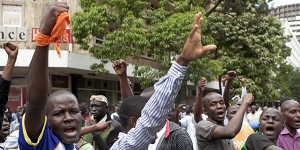Water Security and Conflict Prevention Summit
On September 10, 2013, U.S. Institute of Peace (USIP), the Association of the United States Army (AUSA), and the U.S. Water Partnership (USWP) hosted a summit on the growing concerns in water security and the risks for increased conflict.
Read the event coverage, USIP Hosts International Gathering on Water Security and Conflict Prevention
Water is an undeniable, un-substitutable, and powerful factor in everyone’s life, from sustaining individual lives to defining both economic and social policies and practices. As populations and demand expand while supplies decline, access to water will become increasingly difficult, raising the prospects for conflict over this precious resource. By 2025, experts estimated that 1.8 billion people will be living in countries or regions of absolute water scarcity.





